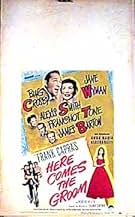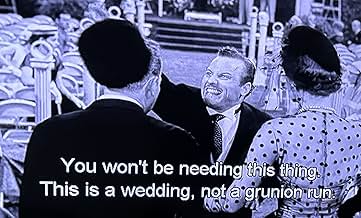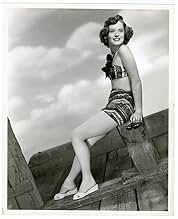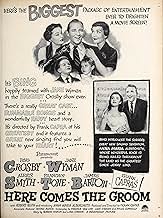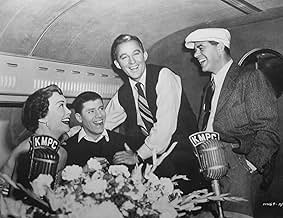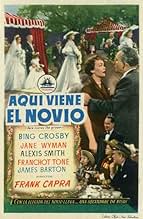VALUTAZIONE IMDb
6,3/10
1250
LA TUA VALUTAZIONE
Aggiungi una trama nella tua linguaForeign correspondent Pete Garvey has 5 days to win back his former fiancée, or he'll lose the orphans he adopted.Foreign correspondent Pete Garvey has 5 days to win back his former fiancée, or he'll lose the orphans he adopted.Foreign correspondent Pete Garvey has 5 days to win back his former fiancée, or he'll lose the orphans he adopted.
- Regia
- Sceneggiatura
- Star
- Vincitore di 1 Oscar
- 3 vittorie e 5 candidature totali
Jacques Gencel
- Bobby
- (as Jacky Gencel)
Recensioni in evidenza
"Here Comes the Groom" is the sort of schmaltzy fluff that Bing Crosby did best. While I am quick to admit that this is a very slight film, it is also a very, very enjoyable film. Deep? Nah--but fun.
The film begins with Bing hanging out with a bunch of cute orphans in post-war France. He's supposed to be coming back to the USA to marry his fiancée (Jane Wyman) but he cannot leave the kids in a lurch--particularly two cute kids who he plans to adopt. The only trouble is that after he's done all the paperwork to bring them to America, he's returned so late that his girlfriend has called off the wedding and is now planning to marry her boss (Franchot Tone). You really can't blame her too much--Bing never told her he'd be late or why he'd be late. In other words, she wasn't feeling very appreciated.
There is a problem with Bing not getting married, however. In order to adopt the kids and keep them he MUST get married...and quick. Bing isn't about to try to find another girl and he really does care about Jane, so he's determined to break up the engagement and marry her himself. Here is where it gets interesting--Bing tells Franchot and Franchot actually allows him a chance to win her back. After all, if she isn't 100% ready to marry him, why not let her marry Bing? Where all this ends is very predictable--but a film like this always is. Along the way, you have some nice comedy (particularly the portions with Alexis Smith) and really nice songs--and it's quite enjoyable and cute. Perhaps it's too cute and saccharine for some--I could understand that. But, if you don't mind and are looking for an old fashioned family film, it's well worth your time.
The film begins with Bing hanging out with a bunch of cute orphans in post-war France. He's supposed to be coming back to the USA to marry his fiancée (Jane Wyman) but he cannot leave the kids in a lurch--particularly two cute kids who he plans to adopt. The only trouble is that after he's done all the paperwork to bring them to America, he's returned so late that his girlfriend has called off the wedding and is now planning to marry her boss (Franchot Tone). You really can't blame her too much--Bing never told her he'd be late or why he'd be late. In other words, she wasn't feeling very appreciated.
There is a problem with Bing not getting married, however. In order to adopt the kids and keep them he MUST get married...and quick. Bing isn't about to try to find another girl and he really does care about Jane, so he's determined to break up the engagement and marry her himself. Here is where it gets interesting--Bing tells Franchot and Franchot actually allows him a chance to win her back. After all, if she isn't 100% ready to marry him, why not let her marry Bing? Where all this ends is very predictable--but a film like this always is. Along the way, you have some nice comedy (particularly the portions with Alexis Smith) and really nice songs--and it's quite enjoyable and cute. Perhaps it's too cute and saccharine for some--I could understand that. But, if you don't mind and are looking for an old fashioned family film, it's well worth your time.
Frank Capra in his autobiography called Bing Crosby, "the master of the cultured ad-lib." A lot of time Crosby would drop several ad-libs into a script and Capra kept them in. According to Capra they were better
than what the screenwriter had written. Of course partnering with Bob Hope in several films and thousands of radio, television, and live shows Bing had to be quick on the uptake.
Capra wanted to do another of his populist films like Mr. Deeds etc., in the three picture deal he signed with Paramount. But after doing Riding High and doing it well with Bing Crosby, he wanted to do one of his type film. The Paramount brass said no, but since he was unhappy at Paramount they agreed to drop their last picture commitment on his contract for one more Crosby film. Just make a good one.
Capra was as good as his word. This film is entertainment plus and a lot of that has to do with the chemistry between Bing and Jane Wyman. Most of Crosby's leading ladies were nice women who just melted with the Crosby charm. Not so here. Ms. Wyman gives as good with the wisecracks as Crosby does and is no pushover. What she is here is a fiancé who's grown tired of waiting for her man who's out gallivanting all over the world as per his job as correspondent. When he finally does come back he has two French orphans in tow. But Jane's decided to marry millionaire Franchot Tone. Bing has to get her back or those kids will be deported. That's where the fun starts.
By now Paramount was giving Crosby vehicles some respectable budgets and that included letting Frank Capra hire a lot of his favorite supporting players. Those folks make a Capra film an enjoyable experience.
Franchot Tone does nicely as millionaire rival and critics were astounded at Alexis Smith who turned out to have a real flair for comedy. Funny parts she wasn't getting at Warner Brothers. She plays a "kissing" cousin of Franchot Tone and figures prominently in Bing's machinations.
They were also astounded at Jane Wyman who nobody realized could sing. Why they were is beyond me since she did start in musical choruses. The song In the Cool Cool Cool of the Evening by Hoagy Carmichael and Johnny Mercer won an Oscar for best song and became one of Bing's million selling records, dueted with Jane Wyman on screen and on vinyl.
The rest of the score is by Jay Livingston and Ray Evans who were under contract to Paramount and for some reason or other never wrote another Crosby film score. Probably because Paramount didn't assign them because many years later they scored and arranged a whole album of duets with Bing and Rosemary Clooney called That Traveling Two Beat Time. And Bing did pretty good with a song written for his friend Bob Hope by them called Silver Bells.
One of the Livingston-Evans songs was a patented philosophical number called Your Own Little House. A nice song on record, on screen it's a great impromptu style number that so many of Crosby's seemed to be. Sung with a group of kids who are French war orphans, Bing does some gentle kidding of fellow entertainers Jimmy Durante and Maurice Chevalier.
This is one of Bing's best and great entertainment.
than what the screenwriter had written. Of course partnering with Bob Hope in several films and thousands of radio, television, and live shows Bing had to be quick on the uptake.
Capra wanted to do another of his populist films like Mr. Deeds etc., in the three picture deal he signed with Paramount. But after doing Riding High and doing it well with Bing Crosby, he wanted to do one of his type film. The Paramount brass said no, but since he was unhappy at Paramount they agreed to drop their last picture commitment on his contract for one more Crosby film. Just make a good one.
Capra was as good as his word. This film is entertainment plus and a lot of that has to do with the chemistry between Bing and Jane Wyman. Most of Crosby's leading ladies were nice women who just melted with the Crosby charm. Not so here. Ms. Wyman gives as good with the wisecracks as Crosby does and is no pushover. What she is here is a fiancé who's grown tired of waiting for her man who's out gallivanting all over the world as per his job as correspondent. When he finally does come back he has two French orphans in tow. But Jane's decided to marry millionaire Franchot Tone. Bing has to get her back or those kids will be deported. That's where the fun starts.
By now Paramount was giving Crosby vehicles some respectable budgets and that included letting Frank Capra hire a lot of his favorite supporting players. Those folks make a Capra film an enjoyable experience.
Franchot Tone does nicely as millionaire rival and critics were astounded at Alexis Smith who turned out to have a real flair for comedy. Funny parts she wasn't getting at Warner Brothers. She plays a "kissing" cousin of Franchot Tone and figures prominently in Bing's machinations.
They were also astounded at Jane Wyman who nobody realized could sing. Why they were is beyond me since she did start in musical choruses. The song In the Cool Cool Cool of the Evening by Hoagy Carmichael and Johnny Mercer won an Oscar for best song and became one of Bing's million selling records, dueted with Jane Wyman on screen and on vinyl.
The rest of the score is by Jay Livingston and Ray Evans who were under contract to Paramount and for some reason or other never wrote another Crosby film score. Probably because Paramount didn't assign them because many years later they scored and arranged a whole album of duets with Bing and Rosemary Clooney called That Traveling Two Beat Time. And Bing did pretty good with a song written for his friend Bob Hope by them called Silver Bells.
One of the Livingston-Evans songs was a patented philosophical number called Your Own Little House. A nice song on record, on screen it's a great impromptu style number that so many of Crosby's seemed to be. Sung with a group of kids who are French war orphans, Bing does some gentle kidding of fellow entertainers Jimmy Durante and Maurice Chevalier.
This is one of Bing's best and great entertainment.
It's a lightweight comedy, but this film has unforgettable moments. Plotwise, it's postwar Capra claptrap complete with French orphans-- but also some dazzling camera work and a few did-I-just-see-that? Surrealistic touches.
The first is a hologram of sorts: Bing's in France listening to an audio letter from fiancée, Jane Wyman-- a Dear John recordio-gram. As it's playing, Wyman materializes on the spinning record, Princess Leia-like. So I should have been prepared for anything, but when Der Bingle is on the plane back to America, he (of course) starts singing to the orphans. The tune is "Misto Cristofo Columbo"-- and suddenly Louis Armstrong walks into the airline cabin, complete with trumpet and hankie-- then up pops the bottom of the Hollywood barrel: Dorothy Lamour, Frank Fontaine and Phil Harris, all singing.
When the plane, and the plot, land in Boston, Bing has to win Jane back from Franchot Tone, which he does via a Pygmalion subplot involving Alexis Smith and men's pajamas. Hubba hubba. Best of all though is one of film's great tracking shots (nothing compared to "I Am Cuba," but still), a song-and-dance number through an office building to "In the cool cool cool of the evening." If only they'd brought Satchmo back for the big double-wedding ending.
The first is a hologram of sorts: Bing's in France listening to an audio letter from fiancée, Jane Wyman-- a Dear John recordio-gram. As it's playing, Wyman materializes on the spinning record, Princess Leia-like. So I should have been prepared for anything, but when Der Bingle is on the plane back to America, he (of course) starts singing to the orphans. The tune is "Misto Cristofo Columbo"-- and suddenly Louis Armstrong walks into the airline cabin, complete with trumpet and hankie-- then up pops the bottom of the Hollywood barrel: Dorothy Lamour, Frank Fontaine and Phil Harris, all singing.
When the plane, and the plot, land in Boston, Bing has to win Jane back from Franchot Tone, which he does via a Pygmalion subplot involving Alexis Smith and men's pajamas. Hubba hubba. Best of all though is one of film's great tracking shots (nothing compared to "I Am Cuba," but still), a song-and-dance number through an office building to "In the cool cool cool of the evening." If only they'd brought Satchmo back for the big double-wedding ending.
A new and improved Jane Wyman appears in this picture with Bing Crosby. She is no longer the violated waif we saw in Johnny Belinda, but a self-confident woman who knows how to sing and clown around. Check out the moment where she visits Mr. Crosby in the guest house and proceeds to fall flat on her face in that larger-than-life dress! And she's sweet in the scenes with the kids, too.
But in case we forget that she's also a serious dramatic actress, there are moments of toughness between her and costar Alexis Smith. The film is a treat for any Wyman fan who enjoys watching the actress prove her versatility time and again, not that she ever had to. We have known about her talent for quite some time now.
But in case we forget that she's also a serious dramatic actress, there are moments of toughness between her and costar Alexis Smith. The film is a treat for any Wyman fan who enjoys watching the actress prove her versatility time and again, not that she ever had to. We have known about her talent for quite some time now.
This film is never considered one of Frank Capra's best, but that shouldn't keep potentially interested viewers from seeing it. On its face, it doesn't seem to be what has come to be known as a Capra film because it isn't issue-laden and doesn't really make a point other than the "follow your heart" admonition that most romantic comedies invoke. In many ways, it's a remake of Capra's "It Happened One Night" (1934), and while it doesn't have the financially and emotionally gut-wrenching backdrop of the Depression to give it the weight of the original, it's nonetheless pleasant and clever.
To appreciate "Here Comes the Groom" is to embrace a bunch of disparate parts. First and foremost, this is a Bing Crosby film, replete with seemingly ad-libbed asides that filled the Hope/Crosby "Road" pictures. Bing, who plays a newspaper reporter (one of Capra's favorite devices) but basically plays himself, has as his foil not just one but three adult characters (his editor, his would-be father-in-law and his romantic competitor), plus a passel of kids, in particular a French boy and girl whom he has virtually adopted as his own. The two kids are cute and genuinely good-natured, so when they are on screen, as they often are, they light up the place. Their repeated mimicry of the Crosby character's signature farewell gesture -- a tooth-filled smile and open-fingered hand wave -- never fails to please (except for the final time, in the film's closing seconds, in which it appears that the duo is starting to run out of steam).
Jane Wyman is a strong presence in the film as well, and quite appealing as someone torn between an elusive true love and the biological clock. She is every bit the musical equal of Crosby in their imaginatively choreographed presentation of the movie's theme song "In the Cool, Cool, Cool of the Evening," staged in various parts of a huge office, then down a half-dozen floors in an elevator and out to the street.
Franchot Tone is the other big name among the actors, and he plays his role as Wyman's rich fiance with characteristic aplomb. Nothing seems to rattle Tone's character, even the possibility of losing Wyman, which may be part of the film's "follow your heart" message.
Easily outshining Tone is Alexis Smith, who never received the career-making, starring roles that she deserved. She plays a caterpillar whom Crosby, in his own strategic interest, turns into a butterfly, and while Crosby's tutelage is over-the-top sexist by today's standards, her transformation and resulting passion are eye-popping, for the Tone character and his staid relatives as well as for the viewer.
With such stong characterizations and actors, Capra for some reason decided he needed something more, so he threw in a grab bag of other elements. Before Crosby and his two adoptees fly back to the States, there's an extended operatic solo by the quite young and show-stopping Anna Maria Alberghetti. And when Crosby and the youthful pair finally get on the plane, they happen to sitting next to a group of USO entertainers, so of course there's a song, "Cristofo Columbo," which brings in fleeting contributions by Louis Armstrong, Frank Fontaine, Dorothy Lamour and Phil Harris. These are tangents, to be sure, and they make the viewer wonder momentarily if Capra has lost his narrative thread, but they don't last long and are engaging in their own right. (Perhaps the "Cristofo Columbo" scene is supposed to echo the "Man on the Flying Trapeze" scene from "It Happened One Night.")
Those looking for further Capra touches will be warmed by the brief appearances of H.B. Warner (the judge in "Mr. Deeds," a senator in "Mr. Smith" and Mr. Gower in "It's a Wonderful Life"), Charles Lane (Potter's real-estate man in "Wonderful Life") and Charles Halton (bank examiner in "Wonderful Life"). The cinematography in this film is serviceable, but there are frustrating instances of sloppiness. At one point, in a reaction shot, the camera mysteriously lingers on Crosby's editor as he does nothing for about five seconds. It's an inconsequential flub, but it feels long enough to make the viewer wonder if the film's cutter and Capra himself just went to sleep. (It's reminiscent of a similar and even longer gaffe in Capra's "You Can't Take It with You" from 1938.)
A more egregious example of visual inattention comes during a physical argument between the Wyman and Smith characters. For the actual fight, in which the two flip each other over with quick arm twists, it's all too obvious that stunt doubles are used. The doubles' faces, which look nothing like those of the two actresses (they may even be men), are repeatedly shown, and the hair color and length of the Smith double doesn't come close to matching the hair of Smith. Who was minding the store when this was shot? It's the kind of mistake that makes all kinds of viewers, not just movie buffs, roll their eyes.
To its credit, the film does lay out, in albeit cliche form, the reality of class differences. But both rich and not-so-rich are given gentle appreciative treatment. Clearly, the viewer is supposed to side with the more down-to-earth characters of Crosby and Wyman, but the rich are not cardboard villains, either. It's almost as if the message is that there is a time and place (and hope) for people from all walks of life.
"Here Comes the Groom" (a clever title in itself) is a product of the pop culture of its time; it's all-white (save for Armstrong), and traditional gender roles hold sway. But look beyond that and you will find a film that you probably didn't know you would like so well. Crosby, as top comic banana, plays his likeable persona perhaps better than ever, and the film leaves lots of smiles in its wake. The ending may be predictable, but this is a movie in which it's just fun to see the character-based twists and turns that steer the plot to its conclusion.
To appreciate "Here Comes the Groom" is to embrace a bunch of disparate parts. First and foremost, this is a Bing Crosby film, replete with seemingly ad-libbed asides that filled the Hope/Crosby "Road" pictures. Bing, who plays a newspaper reporter (one of Capra's favorite devices) but basically plays himself, has as his foil not just one but three adult characters (his editor, his would-be father-in-law and his romantic competitor), plus a passel of kids, in particular a French boy and girl whom he has virtually adopted as his own. The two kids are cute and genuinely good-natured, so when they are on screen, as they often are, they light up the place. Their repeated mimicry of the Crosby character's signature farewell gesture -- a tooth-filled smile and open-fingered hand wave -- never fails to please (except for the final time, in the film's closing seconds, in which it appears that the duo is starting to run out of steam).
Jane Wyman is a strong presence in the film as well, and quite appealing as someone torn between an elusive true love and the biological clock. She is every bit the musical equal of Crosby in their imaginatively choreographed presentation of the movie's theme song "In the Cool, Cool, Cool of the Evening," staged in various parts of a huge office, then down a half-dozen floors in an elevator and out to the street.
Franchot Tone is the other big name among the actors, and he plays his role as Wyman's rich fiance with characteristic aplomb. Nothing seems to rattle Tone's character, even the possibility of losing Wyman, which may be part of the film's "follow your heart" message.
Easily outshining Tone is Alexis Smith, who never received the career-making, starring roles that she deserved. She plays a caterpillar whom Crosby, in his own strategic interest, turns into a butterfly, and while Crosby's tutelage is over-the-top sexist by today's standards, her transformation and resulting passion are eye-popping, for the Tone character and his staid relatives as well as for the viewer.
With such stong characterizations and actors, Capra for some reason decided he needed something more, so he threw in a grab bag of other elements. Before Crosby and his two adoptees fly back to the States, there's an extended operatic solo by the quite young and show-stopping Anna Maria Alberghetti. And when Crosby and the youthful pair finally get on the plane, they happen to sitting next to a group of USO entertainers, so of course there's a song, "Cristofo Columbo," which brings in fleeting contributions by Louis Armstrong, Frank Fontaine, Dorothy Lamour and Phil Harris. These are tangents, to be sure, and they make the viewer wonder momentarily if Capra has lost his narrative thread, but they don't last long and are engaging in their own right. (Perhaps the "Cristofo Columbo" scene is supposed to echo the "Man on the Flying Trapeze" scene from "It Happened One Night.")
Those looking for further Capra touches will be warmed by the brief appearances of H.B. Warner (the judge in "Mr. Deeds," a senator in "Mr. Smith" and Mr. Gower in "It's a Wonderful Life"), Charles Lane (Potter's real-estate man in "Wonderful Life") and Charles Halton (bank examiner in "Wonderful Life"). The cinematography in this film is serviceable, but there are frustrating instances of sloppiness. At one point, in a reaction shot, the camera mysteriously lingers on Crosby's editor as he does nothing for about five seconds. It's an inconsequential flub, but it feels long enough to make the viewer wonder if the film's cutter and Capra himself just went to sleep. (It's reminiscent of a similar and even longer gaffe in Capra's "You Can't Take It with You" from 1938.)
A more egregious example of visual inattention comes during a physical argument between the Wyman and Smith characters. For the actual fight, in which the two flip each other over with quick arm twists, it's all too obvious that stunt doubles are used. The doubles' faces, which look nothing like those of the two actresses (they may even be men), are repeatedly shown, and the hair color and length of the Smith double doesn't come close to matching the hair of Smith. Who was minding the store when this was shot? It's the kind of mistake that makes all kinds of viewers, not just movie buffs, roll their eyes.
To its credit, the film does lay out, in albeit cliche form, the reality of class differences. But both rich and not-so-rich are given gentle appreciative treatment. Clearly, the viewer is supposed to side with the more down-to-earth characters of Crosby and Wyman, but the rich are not cardboard villains, either. It's almost as if the message is that there is a time and place (and hope) for people from all walks of life.
"Here Comes the Groom" (a clever title in itself) is a product of the pop culture of its time; it's all-white (save for Armstrong), and traditional gender roles hold sway. But look beyond that and you will find a film that you probably didn't know you would like so well. Crosby, as top comic banana, plays his likeable persona perhaps better than ever, and the film leaves lots of smiles in its wake. The ending may be predictable, but this is a movie in which it's just fun to see the character-based twists and turns that steer the plot to its conclusion.
Lo sapevi?
- Quiz"In the Cool, Cool, Cool of the Evening" was the fourth song performed by Bing Crosby in a film that went on to win the Academy Award for Best Song.
- BlooperWhen Winifred seeks shelter in Garvey's home, George is on the phone. In a close-up, the phone is to his ear, but in the next medium shot, the phone is hung up, and he picks up the receiver again.
- Citazioni
Husband on Airplane: [Complaining about fellow passenger Bing Crosby's singing on plane] Oh... There they go again ! Don't these actors ever stop making noises?
Wife on Airplane: They're USO people. They sing for soldiers.
Husband on Airplane: Soldiers can shoot back. They've got guns.
- ConnessioniFeatured in Paramount Presents (1974)
- Colonne sonoreMisto Cristofo Columbo
Written by Ray Evans and Jay Livingston
Performed by Bing Crosby, Dorothy Lamour, Louis Armstrong, Cass Daley,
Phil Harris, Frank Fontaine
I più visti
Accedi per valutare e creare un elenco di titoli salvati per ottenere consigli personalizzati
- How long is Here Comes the Groom?Powered by Alexa
Dettagli
- Data di uscita
- Paese di origine
- Lingue
- Celebre anche come
- Here Comes the Groom
- Luoghi delle riprese
- Azienda produttrice
- Vedi altri crediti dell’azienda su IMDbPro
Botteghino
- Budget
- 2.117.000 USD (previsto)
- Tempo di esecuzione1 ora 53 minuti
- Colore
- Proporzioni
- 1.37 : 1
Contribuisci a questa pagina
Suggerisci una modifica o aggiungi i contenuti mancanti

Divario superiore
By what name was È arrivato lo sposo (1951) officially released in India in English?
Rispondi

